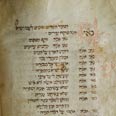
A fixed part of the morning liturgy, this passage demonstrates the challenges to contemporary men and women presented by the sexist nature of the Traditional text.
The Traditional blessing for women, “Blessed are you for creating me as you wished,” tacitly reinforces the traditional male blessing.
A steadily growing cadre of contemporary liturgists has struggled to address the gender inequalities in Jewish tradition.
A well-preserved and rare Siddur from the year 1471, in the collection of the Jewish Theological Seminary (JTS) library, provides a bold alternative.
Instead of the ‘traditional’ female morning blessing we find in traditional prayer books, which reads, “Blessed are you, Lord our God, Master of Universe, for creating me according to your will,” the 600-year-old Siddur provides a morning blessing for women that says, “Blessed are you, Lord our God, Master of the Universe, for you made me a woman and not a man.”
The library of JTS, the Manhattan based academic and spiritual center of the Conservative movement, houses the most significant collection of rare Jewish books and manuscripts in the Western Hemisphere.
Dr. David Kraemer, a professor at JTS and the head of its library, explains that this extraordinary Siddur was commissioned by a wealthy Jewish man from northern Italy as a gift to his wife.
“This Siddur shows a tremendous amount of courage,” said Professor Kraemer, who is also an expert in Talmud and rabbinic literature. “It is common to assume that Jewish women have always accepted this blessing and did not dare to stand against tradition. However, this Siddur proves that at least some Jewish women probably felt uncomfortable with this blessing throughout history.”
'Modern distortion of Judaism'
The Siddur was written by the scribe, Rabbi Abraham Ben Mordechai Farissol, a very well-known Northern Italian rabbi (1451-1525) who was a scholar, cantor, and physician. In addition, he wrote many interpretations of books in the Bible, and literature focused on comparing Judaism, Christianity and Islam.
According to Kraemer, the alteration to the liturgy in the Siddur holds a deep and powerful assertion of women’s religious aspirations, while also implying a clear defiance against the traditional version of the prayer.
“The writer did not just correct it in parallel with the common prayer by writing, ‘Thank G-d For Not Making Me a Man.’ In fact, Rabbi Farissol changed it to a more confrontational line, ‘Thank You G-d For You made Me a Woman and Not a Man,’ which differs from the traditional by both addressing G-d directly and also specifically praising G-d for making her a woman.”
When asked if this Siddur accurately represents the attitude during this time period, Kraemer replied, “There is no clear answer for that, however, Rabbi Farissol was a very well-known and appreciated rabbi, so one can assume that he wouldn’t have agreed to make such a change if he didn’t think it was appropriate.”
According to Rabbi Julie Schonfeld, executive vice president of the Rabbinical Assembly and a prominent public figure in the Jewish world today, there is no chance that this kind of Siddur from 1471 could be compiled and used today in the religious atmosphere we are seeing in much of Israel.
“This Siddur proves that the degrading attitudes towards women, which we are seeing in certain extreme religious communities in Israel today, are a modern distortion of Judaism,” said Rabbi Schonfeld.
“Ironically, treatment of women in certain extreme sectors of the community is far more denigrating to women today than even the attitudes of the late Middle Ages.
“The Siddur demonstrates that throughout history, Jewish women had a deep and powerful desire for religious equality, and a closer connection to God. We can turn to Jewish history for examples of the flexibility of rabbis and scholars in striving to meet the religious needs of men and women. ”















